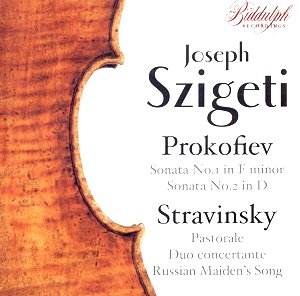Biddulph is back. After
a period of inactivity, the label that
gave Vengerov his first commercial disc,
that branched out from historic violin
to piano and orchestral recordings,
and that kept violin fanciers ever intrigued,
has now inaugurated its rebirth. Who
else should it turn to but that sinewy
intellect of the string world, Joseph
– or Josef or many years ago Joska –
Szigeti, subject of some of the label’s
first ever releases. In new livery –
suitably violinistic – they concentrate
on Szigeti’s 1945-49 recordings of Russian
literature, ones that have proved in
the past elusive and difficult to track
down.
Szigeti’s recording
of the First Violin Concerto of Prokofiev
with Beecham is a benchmark interpretation
and one of his greatest recordings.
I’m sure that for many it occupies the
same kind of place as Oistrakh’s or
Heifetz’s readings do in the later Concerto.
Less well known perhaps is his championing
of these sonatas. He recorded the first
with Joseph Levine, as here, and then
a decade later with Balsam. Likewise
the Second Sonata was recorded with
the fine pianist Leonard Hambro and
then again in the 1959 sessions with
Balsam. In the First, Szigeti is forwardly
recorded and one can hear that sometimes
rather coarse and brittle tone as he
negotiates Prokofiev’s complex technical
and expressive demands. Someone like
Oistrakh lavished far greater tonal
heft and expressive reserves on this
music but there’s no doubting Szigeti’s
control of architecture or local detail.
His bowing does come under pressure
in the Allegro brusco and at some moments
so does his intonation but he reconciles
the rhetoric here as few do – the tensile
and the lyric – and also the moments
of rusticity and dance embedded in the
score. The troublesome Hubay bowing
does let him down occasionally and there
is, at moments, some distinctly unlovely
playing. His Andante redeems much; well-shaped,
full of momentum and direction, never
sectional, linearity in action, no great
tonal intensity – a profile both reflective
and withdrawn. Szigeti and Levine are
rather quicker than the more avuncular
Oistrakh and Frieda Bauer in the finale
and they cultivate real drive, not troubling
to italicise little lyric details and
the ending is first class.
The Second Sonata is
an Oistrakh-inspired violin version
of the work originally written for flute
and piano. It doesn’t bear quite the
weight of demands of the earlier sonata
and Szigeti, recorded four years earlier,
sounds rather more comfortable. Once
again the original recording level was
skewed in favour of the string player
but Hambro emerges with witty credit
and Szigeti deadpans through the Scherzo,
and is unlingeringly charming in the
Andante.
Coupled with Prokofiev
is Stravinsky. There’s an evocative
Pastorale with some impressive collaborators
and an affecting Russian Maiden’s Song.
The most important of the Stravinsky
items though is the Duo Concertante
and this recording with the composer
as accompanist replaced the Samuel Dushkin-Stravinsky
recording made for Columbia in 1933.
Here one finds Szigeti full equipped
to meet intellectual challenges. He
lavished considerable delicacy and understanding
on the two Epilogues and in the faster
music his wiry, abrasive, resinous tone
– uneasy and unsettling sometimes –
acts as a fine contrastive tool, whether
intended or not. His Gigue is full of
rhythmic control and he lavishes some
very expressive portamenti in the Dithyrambe
where his tone is not too astringent,
even if the lower strings can deaden
rather.
The recordings catch
the presence of the originals well.
Notes are interesting – with quotations
from the violinist and from Roland Gelatt
as well as producer Eric Wen’s own sleeve
notes. If I might make the habitual
trainspotter’s plea I must note that
there are no matrix or issue numbers
given and I hope their omission doesn’t
reflect a new policy. Otherwise, a warm
welcome back to this innovative and
important label and its first new release.
Jonathan Woolf
